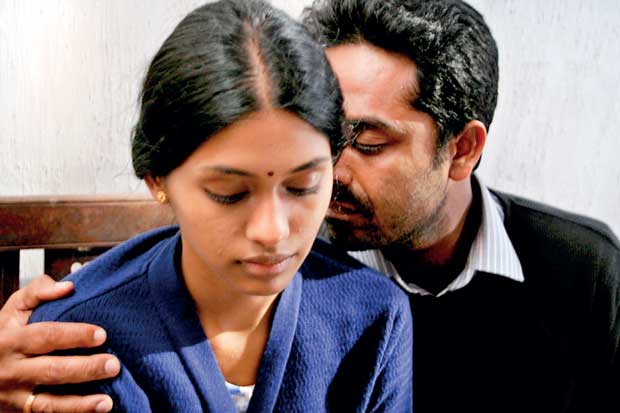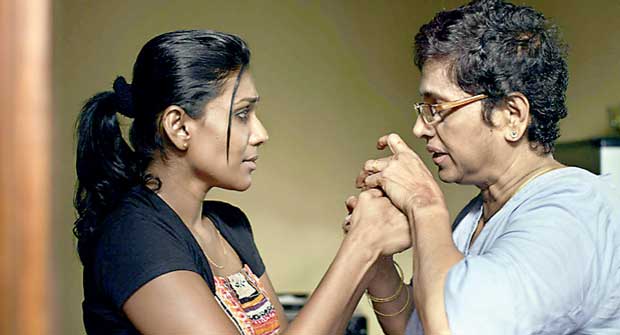Reply To:
Name - Reply Comment
I am amused by the tactics certain critics in this country resort to. They claim in opinion piece after opinion piece that they are free from the dominant ideological hegemonies that are supposed to exist  in the country (Sinhala Buddhism), but then pay obeisance to other more dominant ideologies that hold sway elsewhere (postmodernism). This is as true for political commentators as it is for film and literary critics, after all there’s nothing much to separate the one from the other at the end of the day. The political exists in the cultural, and the cultural exists in the political. That is why I think the problems of our film industry can be traced to the limitations of those who write on the medium.
in the country (Sinhala Buddhism), but then pay obeisance to other more dominant ideologies that hold sway elsewhere (postmodernism). This is as true for political commentators as it is for film and literary critics, after all there’s nothing much to separate the one from the other at the end of the day. The political exists in the cultural, and the cultural exists in the political. That is why I think the problems of our film industry can be traced to the limitations of those who write on the medium.
 Oba Nathuwa Oba Ekka
Oba Nathuwa Oba Ekka
[Prasanna] Vithanage punctures the ongoing lies of the Rajapaksa regime and the media, whose primary mission is to cover up the war crimes that were committed against hundreds of thousands of ordinary people during the bloody conflict
The World Socialist Web (WSW) is a wonderful online portal where committed old leftists get together and churn out article after article examining and revealing conspiracy theories and hegemonies which apparently exert influence over both the private and the public spheres. It has not languished, but it has, as the homepage informs us, been coerced into submission since of late by leading global corporations which want to get it out of the World Wide Web (www). Now I do not subscribe to conspiracy theories, but when it comes to the WSWS, there is enough evidence as to why critiques of establishment politics and disclosures of connections between powerful private interests and the corridors of power established therein can suffice for such corporations to censor such websites in the long run. I am less interested in these allegations, however, than I am in how this site reflects disparate opinions regarding the arts: film reviews, book reviews, theatre reviews.
Selvi is holding her suitcase and Sarathsiri switches on the television, which is broadcasting a military parade celebrating Rajapaksa’s so-called war victory
I know of a friend of mine who expresses distaste at the American cinema and what has not unduly been termed “Hollow-wood” by those who see in the products of that cinema an erasure of the imbalances of power between social milieus in favour of a convenient feel-good liberalism. We all grew up on superheroes, in fact we graduated to superheroes rather early on in our childhoods, because they were pervasive. My friend, who might have grown up on such cosmetic figureheads himself, scoffs at them with the telling remark, “Hollow-wood at it again!” I am not sure whether he shares the sentiments of those who write to the WSWS, but I think that he does. Consider, for instance, this review of Star Wars: The Force Awakens, written by Michael McEgan and David Walsh:
 Age Asa Aga
Age Asa Aga
“Many of those involved in the new film’s production have stated in interviews that the reason people are still attracted to Star Wars after 40 years is that the series has a positive message and gives people ‘hope’. The problem is that this ‘hope’ is not founded on any real answers to, or even explorations of, real problems. The fixation on ‘good’ and ‘evil’ personalities does not go far beyond the tabloid-soap opera approach to social reality – or the rubbish of American political campaigns where voters are encouraged to choose a man or woman based on images generated by the media, entirely apart from their social position and program (‘he has an honest face’, ‘she has leadership capabilities’).”
In Marxist criticism an objet d’art becomes a work of art by its act of being consumed by audiences; the book by its reader, the song by its listener, the film by its viewer. What levels the one with the other, i.e. the objet with its intended recipient, is the dominant framework the former affirms. For McEgan and Walsh, being the seasoned critics they no doubt are, the solutions proposed by a Hollywood blockbuster like Star Wars are at best dichotomised, between an unreal good and an unreal bad, and these are reflected in the world of political advertising where candidates are demarcated as “the way forward” (think of Donald Trump as Darth Vader, Bernie Sanders as Luke Skywalker). In other words, the dominant framework dictates what good and evil are, which in turn explains Hollywood’s fixation in depicting these two as irreconcilable polar opposites.
What these two critics achieve is what any critic worth his or her salt should achieve; the dismantling of the facade in favour of the reality. That is not the preserve of Marxist critics only, of course, after all even Pauline Kael, Susan Sontag, and Roger Ebert (who can’t be considered as Marxists by any stretch of the imagination) indulged in this technique. But then McEgan and Walsh are not mainstream critics; the likes of them have to be content with online portals which are constantly threatened by capitalist censorship, which do not have the funds necessary to pay their contributors. These sites delve deeper than any other site or publication into the underlying framework of a political or cultural process. There’s no critical distancing between the artiste and his intentions, in other words. Entertainment is shown to be the crass, crudely conceived escapist medium it always has been. The experience that Star Wars evokes, consequently, is superficial, operating on a rift between good and evil which the world does not subsist on.
Non-mainstream writers like the above, strangely, find their equivalent in the mainstream critic here, if at all because, as I mentioned in this column last week, there’s a gap in Sri Lanka between art and entertainment in which our critics ignore the audience that patronises the latter to such an extent that they (the audience) feel alienated. It’s a curious phenomenon, deserving of more than a second glance, because in it we see what ails our artistes and what empowers their critics. If the premise of a review of a movie like Star Wars is that it’s faulty because it doesn’t reflect the social reality, and instead shows us a world split between good and evil, it is because the critics themselves are, while committed leftists, aware of the falsifications the left and the right indulge in when portraying that world. In that sense I think our Marxist critics are behind. Way behind.

More often than not, Marxist critics tend to appraise a work of art on the basis of its fidelity to what is social. In Dharmasena Pathiraja’s Bambaru Avith, the protagonist-antihero Victor (Vijaya Kumaratunga) could have been easily turned into a spoilt heir who corrupts Helen, the peasant virgin (Malini Fonseka). But he wasn’t. The reactions Pathiraja’s film got were hence predictable: the critics considered it an aberration that the capitalist/pre-capitalist civilisations contrasted against each other weren’t reflected in a good/bad dichotomy between Victor’s and Helen’s wider milieus. The only praise it got from these critics, as Regi Siriwardena noted, was for its ending, where the Rohana Wijeweera-like Weerasena stands on a platform and delivers an eloquent speech explaining the political reality to the coastal peasants. But here too the critics failed: they were praising his rhetoric when the director had in fact staged that sequence to convey to the audience the futility of resorting to abstractions when discerning any political reality.
Resorting to abstractions and dichotomies is what our critics, especially Marxists, though not always so, indulge in. Again I go back to the World Socialist Web, to a review of another film that came out in 2015 here: Oba Nathuwa Oba Ekka. Just read this excerpt from the review, written by Wasantha Rupesinghe and Panini Wijesiriwardena:
What these two critics achieve is what any critic worth his or her salt should achieve; the dismantling of the facade in favour of the reality
“[Prasanna] Vithanage punctures the ongoing lies of the Rajapaksa regime and the media, whose primary mission is to cover up the war crimes that were committed against hundreds of thousands of ordinary people during the bloody conflict. The point is powerfully driven home in a scene where the young couple arrive home after their marriage. Selvi is holding her suitcase and Sarathsiri switches on the television, which is broadcasting a military parade celebrating Rajapaksa’s so-called war victory.”
Mainstream Hollywood can’t stand up to reality because it takes a decidedly refined, artificial approach to that reality. Rupesinghe and Wijesiriwardena take each and every point in the plot in terms of their fundamentalist distinction between “good” and “bad”. So how does one differentiate between the two reviews? By understanding that THOSE critics prefer a film that unearths the real structures of power hidden by artificial good/bad rifts, and that OUR critics like to unveil the ethnic (and class) relations those structures of power thrive on by looking for a good/bad distinction in the films they are reviewing. To their credit, of course, the latter two do point at a significant aspect of the war that Vithanage’s film brings up: “the unemployed Sinhalese youth forced into the war by economic circumstances.” But the good/bad rift remains, intact: there are no shades of grey, no middle ground or territory. Only the one or the other. Has this helped improve our movies, particularly those touted as serious and art house? Probably not.